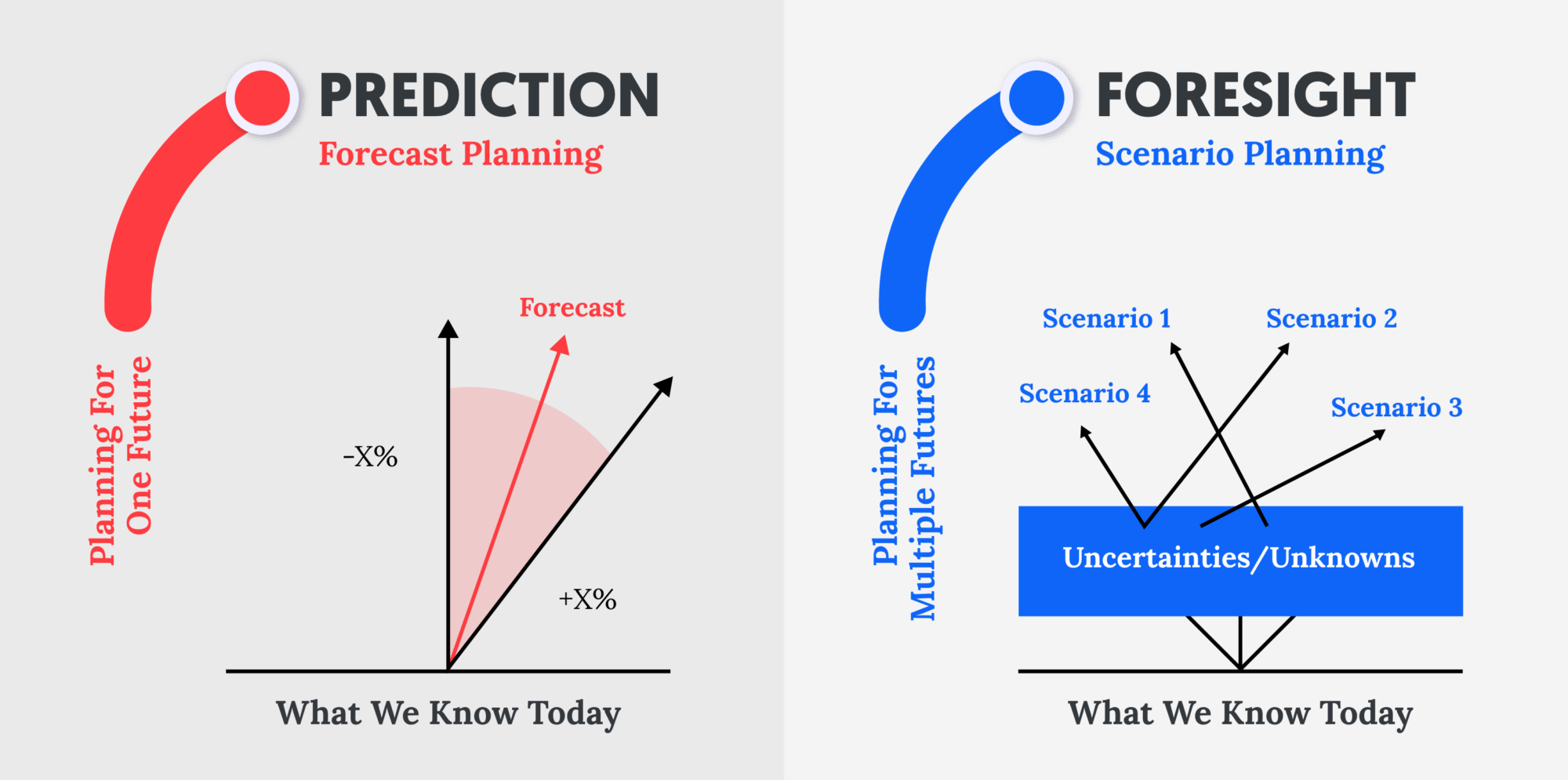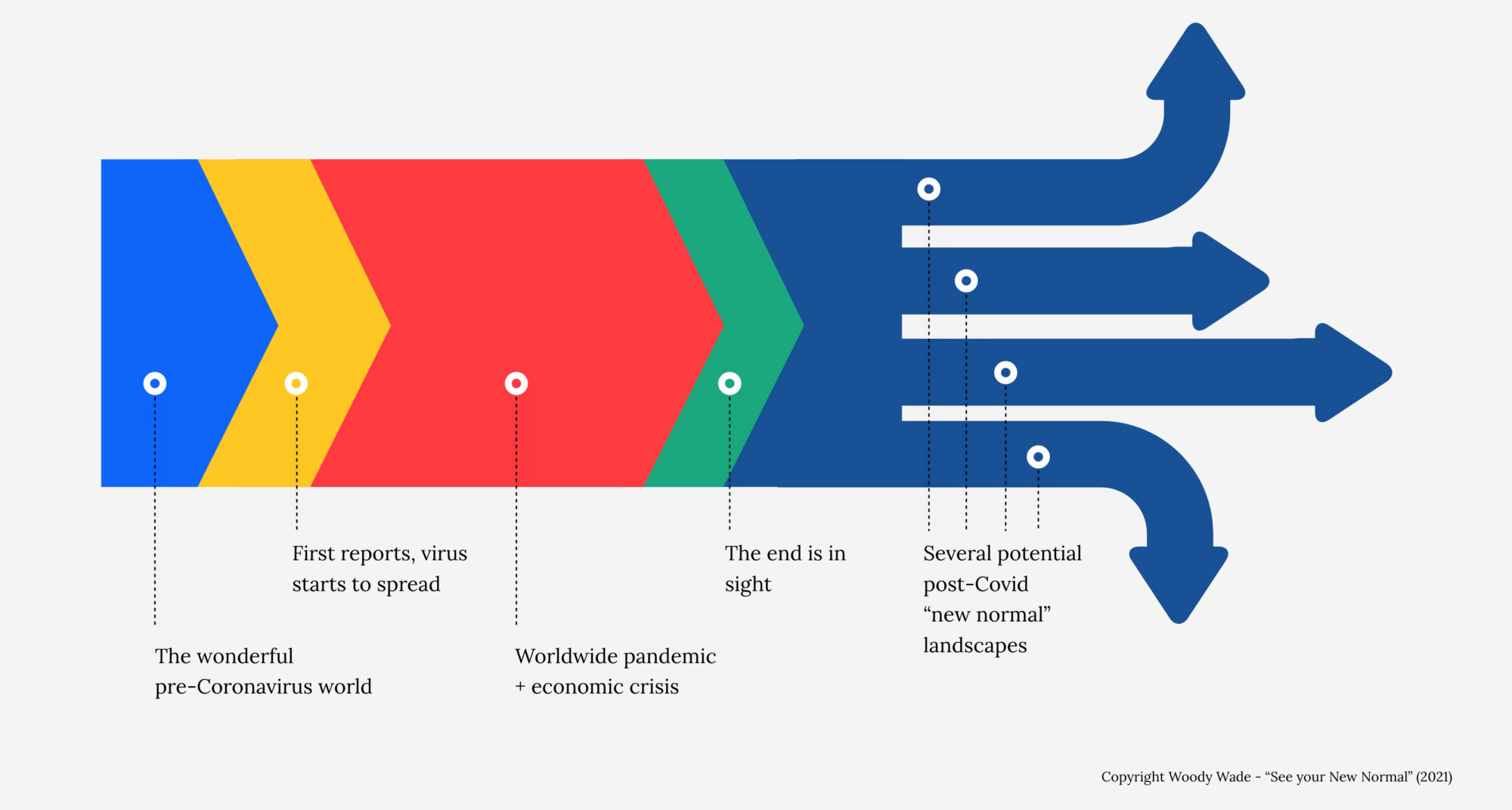
See your New Normal with Scenario Planning
By Miriam Kugel
As the world is trying to emerge from the Covid-19 pandemic, many company leaders are starting to prepare for the new reality of business. But what will business-as-usual look like post-pandemic? And how can we be sure we are preparing for the most likely scenario ahead – including potentially disruptive events like the pandemic? To get a grip on possible outcomes, many leaders are opting for scenario planning exercises as a useful tool to help steer their company confidently into the (many possible) future(s) ahead.
Woody Wade, renowned book author and Associate Scenario Planning Expert at New Metrics, and Philippe Georgiou, Associate Crisis Management Expert at New Metrics, share some of their views in an interview after recently running a scenario planning workshop for a financial services client in Oman:
In a nutshell, what is scenario planning and how is it different from, say, forecasting?
Woody Wade explains: “They both look at the future, but in different ways. Scenario planning is a methodology that helps you foresee how your “big picture” might change – and recognize that it might not evolve only in the direction you expected. That’s because completely different futures are always possible, depending on how key uncertainties play out. With scenario planning, you identify what these uncertainties are for your organization, and what the different futures could realistically be, based on how they might resolve themselves. You go through a structured process that reveals alternative outcomes that are different but still entirely plausible.”
“Forecasting, on the other hand, has more to do with trying to predict the future, usually in quantitative terms. Scenario planning is about foreseeing entire landscapes – so it’s primarily qualitative. Of course, you can also quantify how various KPIs would be likely to evolve in those landscapes. But scenario planning isn’t about trying to get the numbers right. You’re not trying to predict or project what will happen but exploring what could happen. The reason for doing this is simple: If you can foresee how more than one future might plausibly develop for your business, you can prepare yourself earlier for the opportunities – and challenges – that could arise in each one.”
Philippe Georgiou adds: “Scenario Planning falls into the overall context of Crisis Management. By identifying possible scenarios around critical uncertainties within a specific time frame, Scenario Planning complements the operational components of risk assessment, contingency planning, and business continuity planning by adding a strategic dimension to the forecasting exercise.”
Woody, do you see this approach as relevant to businesses in Oman?
“Absolutely. Leaders in every industry and every country share a common burden. It was Jeff Immelt, the former CEO of GE, who said, “I have to manage for tomorrow’s world.” If you’re responsible for the future success – of an entire company or even just a single project – you have to make decisions today that may only play out in a year, or two years, or even longer. And millions may be on the line. So, you really need to have an idea how the future landscape could change, because that’s where your decisions today will play out.”
So, what can a company do to kick-start the planning process, especially when they don’t know how to start?
Philippe Georgiou explains: “For companies that like to explore Business Scenario Planning in the future, it is recommended to start with a 1–2-day co-creation workshop organized for the cross-functional management team. The workshop follows a logical, very structured process where the group of 10-15 managers will walk through the practical “how-to” aspects, with each part of the process underlined with the best examples applicable to the wider context of the business.”
What is the expected outcome of such an exercise, Woody?
“The exercise’s core objective is to generate a portfolio of possible scenarios and visualize them in a degree of relevant detail. In a final optional session – one that can take place immediately following the first session or after some time – we then work with the business leaders to develop a strategic response to each of the scenarios. Besides gaining practical know-how, the approach gives managers permission to try a completely new way of thinking. You’re going to emerge with an appreciation for visualizing the future in terms of alternative possibilities rather than the conventional way people think about the future, which is to assume that things will evolve in a linear, predictable way.”
We all know that the future is going to be different. That’s a given. But how will it be different? Scenario planning helps you foresee this. So as a business leader, it is imperative to think ahead, anticipate not one possible future but a range of possible futures with the businesses’ position in this “new normal” vividly explored and reimagined.
If you would like to connect with Woody or Philippe about Scenario Planning or Crisis Management or like to find out more about scenario planning workshops, please reach out to mkugel@newmetrics.net
(This article has also been published in Oman Observer on January 31, 2022. Click here to view.)
About the experts:
About Woody Wade, Associate Scenario Planning Expert, New Metrics:
Woody is the author of “Scenario Planning: A Field Guide to the Future” (Wiley, 2011). Last year, he released a new expert guide called: “See Your New Normal,” a practical handbook to scenario planning for the post Coronavirus world. Based in Switzerland, Woody has held many senior appointments including being an Executive Board member of the World Economic Forum. Woody holds an MBA from Harvard Business School and taught as an adjunct professor in two MBA programs in Switzerland and currently sits on the Advisory Board of the Master’s Program in Future Foresight Studies at the Rochester Institute of Technology’s Dubai campus.
About Philippe Georgiou, Associate Crisis Management Expert, New Metrics:
Philippe is a Strategic Communications and Crisis Management Expert with demonstrated expertise in rolling out complex Crisis Management Strategies for some of the world’s leading organizations including Coca Cola as their Public Affairs and Communications Director for 20 years as well as locally in Oman for the Ministry of Tourism and Oman Air. Philippe holds a Bachelor’s Degree in Engineering and an MBA in Business Administration and a minor in Marketing from The American University of Beirut and the Lebanese American University.


